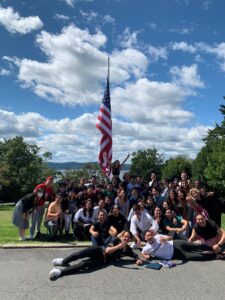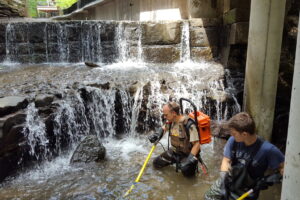
If you find yourself driving on Neperan Road around Tarrytown Reservoir headed towards Tarrytown for the first time, you might be surprised to see an imposing building with a bright golden dome directly in front of you. Familiar to almost anyone from Tarrytown and the surrounding villages, that dome is at the center of the EF International Language Center’s 25-acre campus – the largest EF campus in the world.
What looks like a college campus – it was in fact once the home of Marymount College – is home to as many as 1,500 students from over 70 countries at any given time. And they are all here for the same reason says Andrea Arakaki, the school’s executive director. “Our students’ first objective is to learn English, to get a better proficiency in their language skills. But all of them also have a second objective which is to experience and live in a different culture. So, we call the EF experience “live the language”.

For the students on the Tarrytown campus, exploring the area is key. “Here in Tarrytown, it’s about getting to know the village, understanding how the local people live, connecting with local events and why they happen, how they happen,” says Arakaki. As many local shopkeepers will tell you, on most days you’ll see a constant flow of EF students walking down the hill into town. “Living the language means live like a local. Experience like a local.”
One of the most interesting ways that EF students “live like a local,” is by living with local families (or individuals) while they are here. Since students stay for periods ranging from two weeks to up to a year, people can host a student for both short and long-term stays. And Arakaki, who was once an EF student herself, knows how memorable living with a host family can be. “I still remember the smell of the house I lived in. My ‘mom’ used to cook for us at night so from school I would come back home for dinner. And I still remember the smell of the pie she used to make for dessert.”
As many host families will say, the experience can be as rewarding to the host as it is to the student. With students from 70 nationalities placed with hosts, it’s an opportunity for local families to learn about other cultures while their student guests are learning about ours.
Like anyone visiting a foreign country, new students have to learn the cultural norms of their new country. To help them understand some of the dos-and-don’ts, all EF students go through a full day of orientation. “Little things like using crosswalks, paying attention to where to go and not go, how to speak with people are emphasized,” says Arakaki. “Depending on the country they come from, it’s not right or wrong, bad or good, it’s just different. Sometimes the perception might be that the students can be rude but it’s not being rude. It’s how they learned in their own country.”
If you are interested in becoming an EF host, contact sheyenne.kiesel@ef.com or 914-597-7237.






